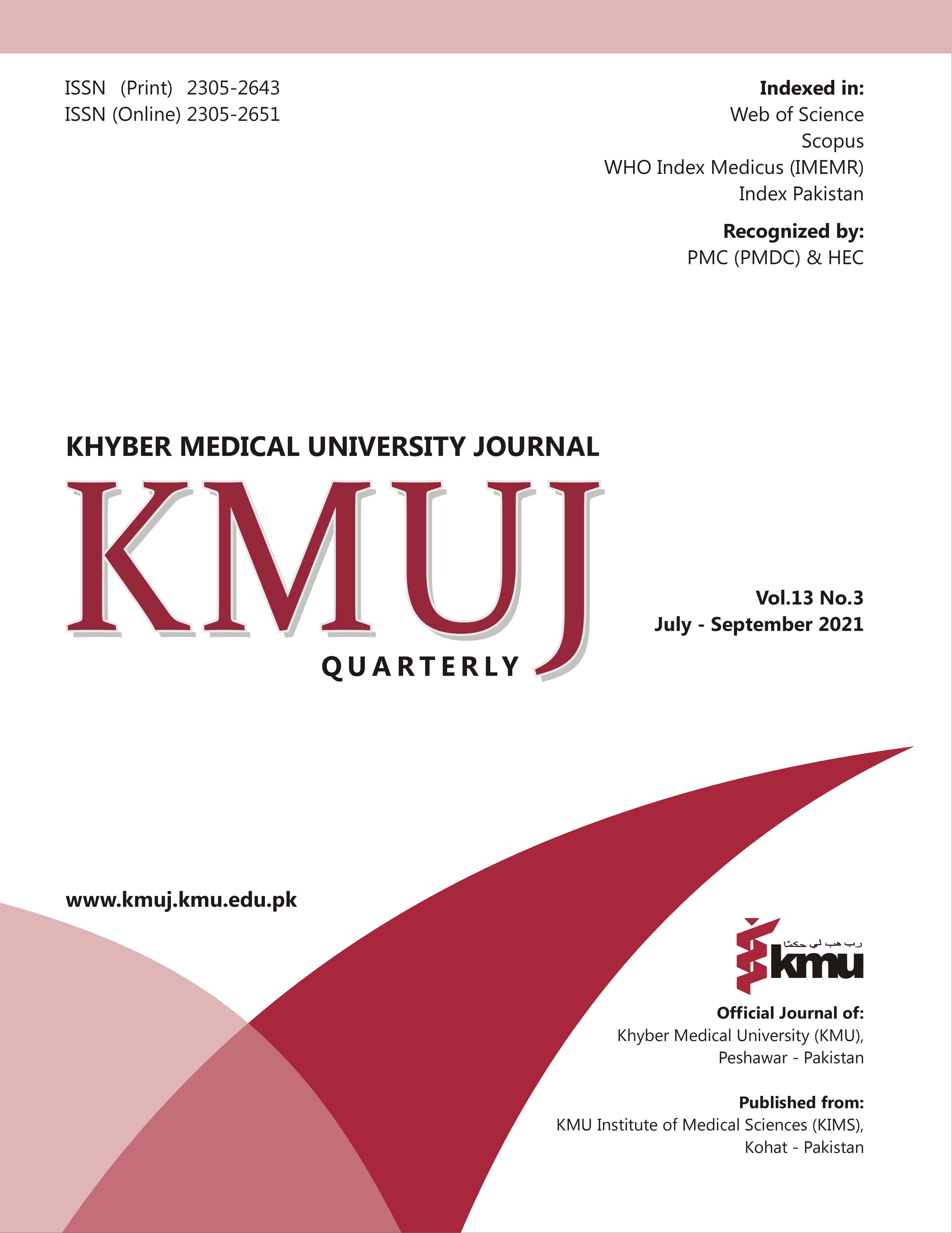PSYCHOLOGICAL DISTRESS, PERCEIVED SOCIAL SUPPORT, AND LIFE SATISFACTION OF FATHERS AND MOTHERS OF INTELLECTUALLY DISABLED CHILDREN
Main Article Content
Abstract
OBJECTIVE: to examine psychological distress, social support, and life satisfaction of fathers and mothers of intellectually disabled children in our local setting.
METHODS: This cross-sectional study was conducted from 2017 to 2019 at Department of Psychology, University of Peshawar, after approval of Advanced Studies Research Board of university. One hundred and fifty parents (75 mothers and 75 fathers) of intellectually disabled children were selected through purposive sampling technique from Peshawar, Wah Cantonment & Islamabad, Pakistan. Instruments including Depression Anxiety Stress Scale, Multidimensional Scale of Perceived Social Support, and Satisfaction with Life Scale were administered.
RESULTS: Majority (n=64/150; 42.7%) of parents were aging from 20 -35 years. Seventy eight (52%) parents were from province of Khyber Pakhtunkhwa and 72 (48%) were from Punjab. Findings indicated that fathers’ mean scores were lower on depression anxiety stress scale (M=44.78; SD=14.55) as compared to mothers (M=97.32; SD=34.14). Fathers mean scores were higher on perceived social support (M=43.15; SD=9.30) than mothers (M=25.18, SD=14.36). On life satisfaction fathers means scores (M=17.36, SD=4.42) were also higher than mothers mean scores (M=9.74, SD=6.06)
CONCLUSION: The study results indicated that in our cultural context fathers of the disabled children reported better perceived social support and life satisfaction while mothers experienced higher psychological distress (depression, anxiety, and stress). The role of parents in the children’s lives is concerning area because ignoring such parents’ mental health issues can triggers a lot of problems in this society.
Article Details
Work published in KMUJ is licensed under a
Creative Commons Attribution 4.0 License
Authors are permitted and encouraged to post their work online (e.g., in institutional repositories or on their website) prior to and during the submission process, as it can lead to productive exchanges, as well as earlier and greater citation of published work.
(e.g., in institutional repositories or on their website) prior to and during the submission process, as it can lead to productive exchanges, as well as earlier and greater citation of published work.
References
Kumari V. Parental involvement and expectations in promoting social and personal skills of mentally challenged children [dissertation]. Dharwad, India: Dharwad University.; 2009.
Roach MA, Orsmond GI, Barratt MS. Mothers and fathers of children with Down syndrome: Parental stress and involvement in child-care. Am J Ment Retard 1999;104: 422-36. https://doi.org/10.1352/0895-8017(1999)1040422MAFOCW2.0.CO_2.
Ross C, Blanc H. Parenting stress in mothers of young children with oppositional defiant behavior disorder and other severe behavior problems. Child Study J 1998; 28:93-110.
Podolski CL, Nigg J. Parent stress and coping in relation to child ADHD severity and associated child disruptive behavior problems. J Clin Child Psychol 2001;30:503–13. https://doi.org/10.1207/S15374424JCCP3004_07.
Barrera M, Ainely SL. The structure of social support: A conceptual and empirical analysis. J Community Psychol 1983;11:133-44. https://doi.org/10.1002/1520-6629(198304)11:2133.
House JS, Kahn RL. Measures and concepts of social support. In Cohen S, Syme SL, editors. Social support and health. Orlando, FL: Academic Press; 1985. p. 83-108.
Tracy EM, Whittaker JK. The social network map: Assessing social support in clinical practice. Fam Soc 1990: 461-70. https://doi.org/10.1177/104438949007100802.
Diener E, Emmons R, Larsen R, Griffin S. The satisfaction with life scale. J Pers Assess 1985; 49(1): 71–75. https://doi.org/10.1207/s15327752jpa4901_13.
Emerson E. Mothers of children and adolescents with intellectual disability: social and economic situation, mental health status, and the self‐assessed social and psychological impact of the child’s difficulties. J Intellect Disabil Res 2003; 47(4‐5): 385–99. https://doi.org/10.1046/j.1365-2788.2003.00498.x.
Lee J. Maternal stress, well-being, and impaired sleep-in mothers of children with developmental disabilities: A literature review. Res Dev Disabil 2013; 34(11): 4255–73. https://doi.org/10.1016/j.ridd.2013.09.008.
Totsika V, Hastings RP, Emerson E, Lancaster GA, Berridge DMA. Population‐based investigation of behavioral and emotional problems and maternal mental health: Associations with autism spectrum disorder and intellectual disability. J Child Psychol Psychiatr 2011;52(1):91–9. https://doi.org/10.1111/j.1469-7610.2010.02295.x.
Singer GH. Meta-analysis of comparative studies of depression in mothers of children with and without developmental disabilities. Am J Ment Retard 2006; 111(3): 155-69. https://doi.org/10.1352/0895-8017(2006)111155MOCSOD2.0.CO2.
Gupta VB, Mehrotra P, Mehrotra N. Parental stress in raising a child with disabilities in India. Disability, Community-Based Rehabilitation Inclusive Development 2012;23(2):41–52. https://doi.org/10.5463/dcid.v23i2.119.
Azeem MW, Dogar IA, Shah S, Cheema MA, Asmat A, Akbar M, et al. Anxiety and depression among parents of children with intellectual disability in Pakistan. J Am Acad Child Adolesc Psychiatr 2013; 22: 290–5.
Soman S, Bhat SM, Latha KS, Praharaj SK. Gender differences in perceived social support and stressful life events in depressed patients. East Asian Arch Psychiatry 2016; 26(1):22-9.
Al-Attiyah A, Nasser R. Gender and age differences in life satisfaction within a sex-segregated society: Sampling youth in Qatar. Int J Adolesc Youth 2013: 84-95.
Joshanloo M, Jovamovic V. Gender differences in the predictors of life satisfaction across 150 nations. Pers Individ Dif 2019;135:312-5. https://doi.org/ 10.1007/s00737-019-00998-w.
Planalp EM, Braungart-Rieker JM. Determinants of father involvement with young children: Evidence from the early childhood longitudinal study birth cohort. J Fam Psychol 2016; 30:135–46. https://doi.org/10.1037/fam0000156.
Cabrera NJ, Tamis-LeMonda CS. Handbook of father involvement: Multidisciplinary perspectives. New York: Routledge; 2013.
Lovibond PF, Lovibond SH. The structure of negative emotional states: Comparison of the depression anxiety stress scales (DASS) with the beck depression and anxiety inventories. Behav Res Ther 1995; 33(3):335-43. https//doi.org/10.1016/0005-7967(94)00075-u.
Zimet GD, Dahlem NW, Zimet SG, Farley GK. The multi-dimensional scale of perceived social support. J Pers Assess 1988; 52: 30-41. https://doi.org/10.1207/s15327752jpa5201_2.
Aldosari MS, Pufpaff LA. Sources of stress among parents of children with intellectual disabilities: A preliminary investigation in Saudi Arabia. JOSEA 2014; 3(1):1-21.
Kawa MH, Shafi H. Evaluation of internet addiction, impulsivity and psychological distress among University Students. Int J Clin Ther Diagn 2015;3(1):70-6.
Watkins DC, Johnson NC. Age and gender differences in psychological distress among African Americans and Whites: Findings from the 2016 National Health Interview Survey. Health Care 2018;6(1): 6. https//doi.org/10.3390/healthcare6010006.
Hayat I, Zafar M. Relationship between psychological well-being and coping strategies among parents with Down syndrome children. Int J Human Soc 2015; 7(1): 109-17.
